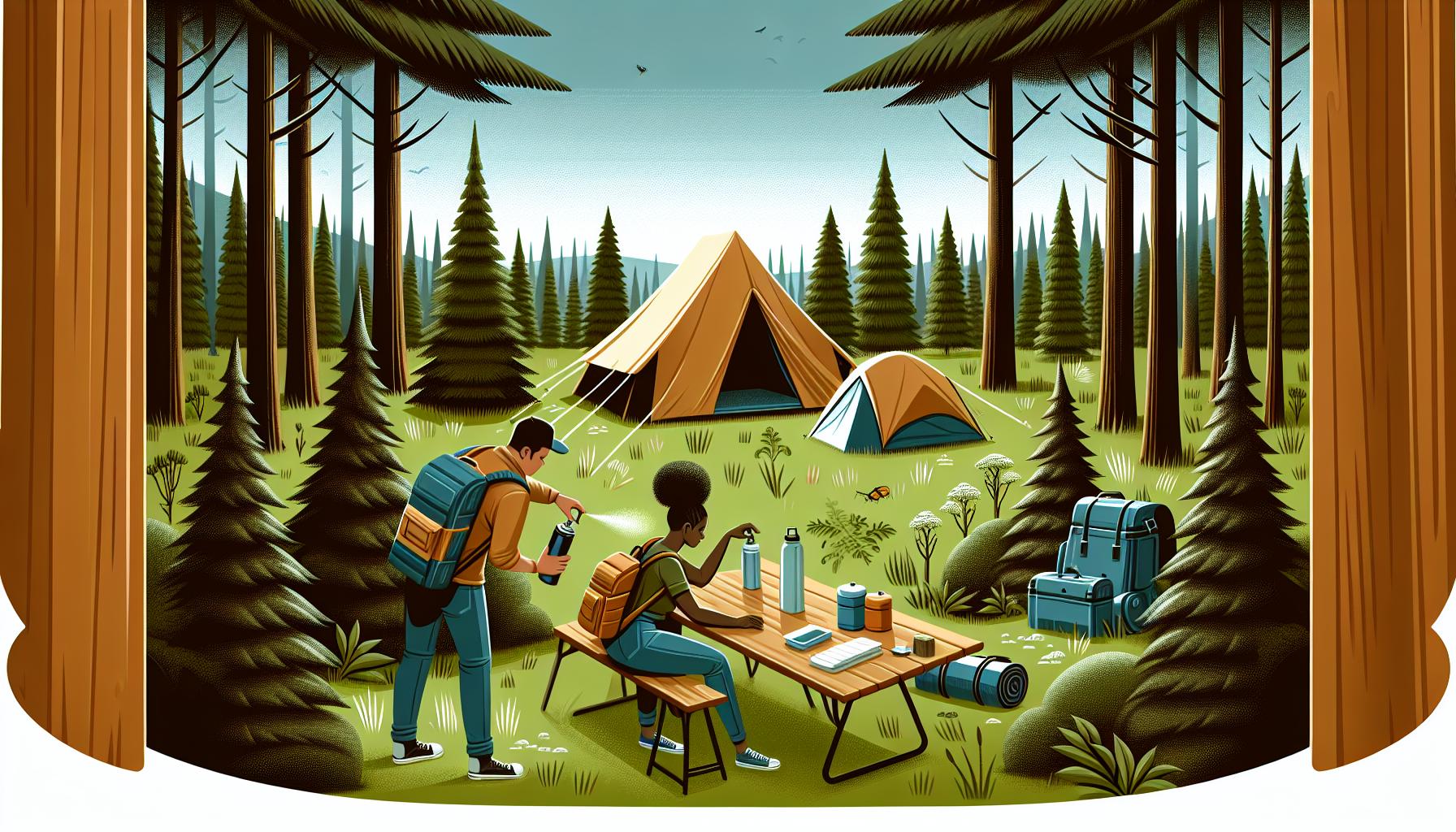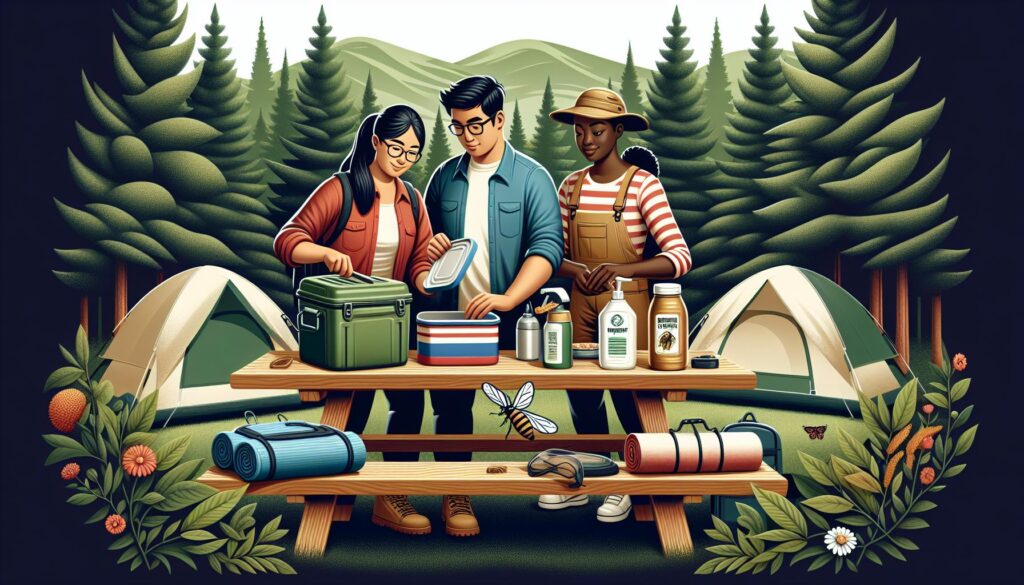Camping offers a fantastic escape into nature, but nothing ruins a peaceful trip faster than a swarm of yellow jackets. These aggressive wasps can turn a serene campsite into a battleground, leaving you swatting and dodging stings. I’ve faced this challenge multiple times, and through trial and error, I’ve discovered effective strategies to keep these pesky insects at bay.
Understanding yellow jacket behavior is key to preventing their intrusion. They’re attracted to food and sweet drinks, making your campsite an inviting target. By taking a few proactive steps, you can significantly reduce the chances of encountering these unwelcome guests and enjoy a sting-free camping experience.
Understanding Yellow Jackets and Camping
Identifying Yellow Jackets
Yellow jackets are predatory wasps known for their black and yellow markings. Unlike bees, which have fuzzy bodies, yellow jackets have smooth, slender bodies. Wings lie flat against their bodies when at rest. If yellow jackets appear around food or trash, they likely belong to social colonies that can contain thousands of members. Observing these traits aids in quickly identifying yellow jackets versus other insects.
Why Yellow Jackets Are Attracted to Campsites
Yellow jackets are attracted to campsites due to the presence of food, sweet drinks, garbage, and food residues. They seek protein sources such as meat and sugary substances. Campsites often provide these attractants, making them prime locations for yellow jacket activity. Understanding this behavior helps in implementing preventive measures, like storing food securely and managing waste efficiently, to minimize their presence while camping.
Preventative Measures Before Camping

Choosing the Right Campsite
Selecting a campsite far from known yellow jacket nests reduces the risk of encounters. Check for visible nests in trees, shrubs, and the ground. Avoid spots near trash bins or food sources, which attract yellow jackets. Consider camping in open areas where yellow jackets are less likely to nest.
Preparing Your Gear
Use insect-repellent sprays on tents and camping equipment to deter yellow jackets. Store food in airtight containers to prevent attracting them with lingering scents. Keep your campsite clean by immediately disposing of trash in sealed bags. Pack a first-aid kit with treatments for stings in case of an encounter.
Practical Tips During Camping

Safe Food Storage Practices
Keep food storage safe by using airtight containers. Yellow jackets locate food by scent, so airtight seals eliminate attractive odors. Store all food in a sealed cooler when not preparing meals. This approach also applies to beverages and snacks. Keep coolers inside vehicles when possible to avoid attracting yellow jackets to your campsite.
Use mesh or net food covers to protect food during meals. These physical barriers stop yellow jackets from reaching food. Remove trash immediately after eating and store all waste in sealed bags. Disposing of waste in dedicated receptacles far from the campsite adds an extra layer of security.
Using Natural Repellents
Natural repellents help deter yellow jackets without harmful chemicals. Essential oils like peppermint, clove, and lemongrass act as effective repellents. Mix a few drops of these oils with water in a spray bottle and apply around the campsite. This mix creates a smell that yellow jackets dislike, keeping them at bay.
Herbs like mint, basil, and thyme also repel yellow jackets. Plant these around the campsite if possible. Otherwise, place sprigs of these herbs near food areas. Burn citronella candles for added protection, as the smoke and scent repel yellow jackets and other insects.
These practices, coupled with preventive measures from the previous section, create an effective strategy to keep yellow jackets away while camping.
Additional Safety Measures

What to Do If You Are Stung
Knowing what to do if you get stung by a yellow jacket can mitigate pain and complications. First, clean the area with soap and water to prevent infection. Apply a cold pack to reduce swelling and discomfort. Over-the-counter pain relievers like ibuprofen can help manage pain. If you know you’re allergic, carry an epinephrine injector and administer it immediately. Seek medical attention if you experience severe reactions such as difficulty breathing, swelling of the face or mouth, or dizziness.
Educating Fellow Campers
Educating fellow campers about yellow jacket safety is crucial. Hold a brief meeting to share key preventive measures like proper food storage and identifying nest areas. Demonstrate the use of natural repellents and explain the importance of not swatting at yellow jackets, as it can provoke them. Create a buddy system to ensure everyone has support if stung. Share emergency contact information and ensure everyone knows the location of the nearest healthcare facilities. This collaborative approach enhances everyone’s safety and preparedness.
Conclusion
Camping should be a fun and relaxing experience without the worry of yellow jackets. By understanding their behavior and taking proactive measures like securing food and using natural repellents, we can significantly reduce the risk of encounters. Remember to educate your fellow campers and create a supportive environment where everyone knows how to stay safe. Preparedness and teamwork go a long way in ensuring a sting-free adventure.
Frequently Asked Questions
What are yellow jackets?
Yellow jackets are a type of wasp that can be aggressive, especially when their nest is threatened. They are known for their distinctive black and yellow stripes and can deliver painful stings multiple times.
How can I prevent yellow jacket encounters while camping?
To prevent yellow jacket encounters, understand their behaviors, secure food in airtight containers, and choose campsites away from nests. Using natural repellents and keeping the campsite clean can also significantly reduce the risk.
What are some effective natural repellents for yellow jackets?
Natural repellents include essential oils like peppermint, eucalyptus, and clove. Simply mix them with water and spray around your campsite to deter yellow jackets.
How should I store food to avoid attracting yellow jackets?
Store food in airtight containers and place them in coolers or vehicles when not in use. Immediately clean up any food spills and dispose of trash in sealed bags or designated areas.
What should I do if I get stung by a yellow jacket?
If stung by a yellow jacket, clean the area with soap and water, apply a cold pack to reduce swelling, and take an antihistamine if necessary. Seek medical help if you experience severe reactions like difficulty breathing or swelling of the face and throat.
What is the importance of educating fellow campers about yellow jacket prevention?
Educating fellow campers helps create a safer environment by ensuring everyone knows how to avoid attracting yellow jackets, use repellents properly, and respond effectively if stung. This collective knowledge reduces risks and enhances preparedness.
How can a buddy system help in preventing yellow jacket encounters?
A buddy system ensures that campers watch out for each other, share preventive measures, and can quickly assist in case of an emergency, such as a sting. This collaborative strategy increases overall safety and readiness.
